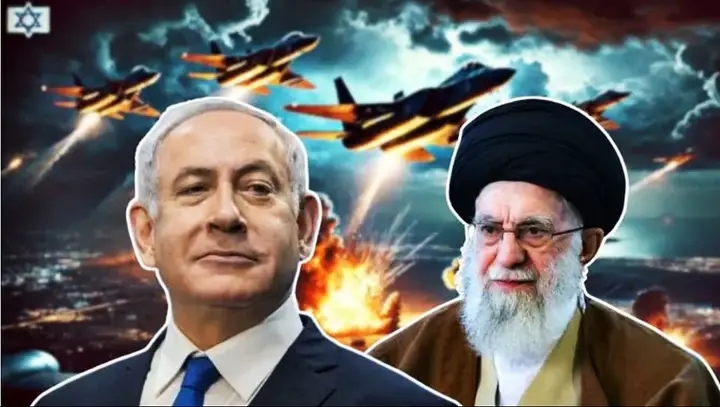By Ollus Ndomu
“We will strike every site and every target of the ayatollah regime.”
Those were the chilling words from Israeli Prime Minister Benjamin Netanyahu this past weekend, amid a rapid military escalation that has stunned analysts and shaken an already volatile Middle East. But beneath the thunder of airstrikes and political proclamations lies a deeper, more complex question: What is Israel’s real endgame, and who is calling the shots?
The Shadow of Regime Change
For Netanyahu, Iran has always been the threat. From his infamous cartoon bomb at the UN to consistent warnings about Tehran’s nuclear ambitions, his voice has been the loudest. But the scale of this week’s attacks, targeting not just nuclear sites but economic hubs, military personnel, and scientists, hints at a broader ambition.
“Now he is in, he is all in,” one Western official told the BBC, describing Netanyahu’s unrestrained posture.
While Israel’s official line stresses pre-empting Iran’s nuclear capabilities, the messaging has blurred. Netanyahu addressed the Iranian people in English, promising that Israeli operations were “clearing the path for you to achieve your freedom.” That kind of language doesn’t point to deterrence, it hints at regime change.
Yet, seasoned analysts caution against wishful thinking.
“Predicting or engineering the downfall of the Iranian regime is pointless. It could happen soon—or in 20 years,” said Anshel Pfeffer, Israeli correspondent for The Economist.
A Calculated Strike or a Diplomatic Sabotage?
The timing couldn’t be more suspect. Just days before nuclear talks were to resume in Oman, Israeli jets lit up Iranian skies. The Fordow, Isfahan, and Natanz nuclear sites, central to Iran’s atomic infrastructure were all hit.
“These strikes were designed to kill Trump’s chances of reaching a nuclear deal,” argued Ellie Geranmayeh of the European Council on Foreign Relations.
While President Trump has wavered first calling for calm, then praising the strikes, the truth is that Israel attacked on the 61st day of a 60-day window the US gave Iran to finalize a deal.
Coincidence? Hardly.
Collateral Targets: Scientists, Civilians, Stability
As of Sunday, at least nine Iranian nuclear scientists and numerous commanders have reportedly been assassinated. Economic targets and infrastructure including electricity and oil facilities are also being hit.
This raises alarm under international law. The IAEA has condemned the attacks on nuclear facilities, and legal experts argue these strikes violate the UN Charter.
“I have repeatedly stated that nuclear facilities must never be attacked, regardless of the context,” emphasized Rafael Grossi, IAEA Director-General.
Iran, reeling from years of sanctions, is now absorbing both physical and psychological damage. Civilians in Tehran have been killed, homes leveled, and the country’s power grid destabilized.
“Iranians may dislike their regime, but they won’t embrace an aggressor dropping bombs on their apartments,” said Prof. Vali Nasr of Johns Hopkins University.
Can Israel Hit Fordow and at What Cost?
Fordow remains the crown jewel of Iran’s nuclear sites, buried deep in a mountain. Israel doesn’t possess bunker-busting bombs needed to destroy it. But the U.S. does.
Cue Trump.
“I think the most likely scenario is Netanyahu calling Trump and saying: ‘I’ve done all this, but I need MOPs to finish the job,’” said Richard Nephew, former US official and Iran expert.
This presents a terrifying question: Is Israel dragging the U.S. into a war it doesn’t want?
Daniel Levy, former Israeli peace negotiator, is blunt:
“Only the US can bring this to a timely end-point… Success or failure is overwhelmingly being defined by whether the US can be dragged in.”
The African Angle: Why We Must Watch This Closely
For African nations many of whom balance relations with both Israel and Iran, the stakes are significant. Fuel prices will likely spike. The Red Sea, a vital trade route for East Africa, may become a battleground. And if the US is pulled in, so too might global institutions where African peacekeepers operate or rely on funding.
But more critically, Africa must learn from this. The geopolitics of the Middle East remind us: national interests trump international law, power respects power, and perception shapes reality.
This is not just about bombs and bunkers, it’s about narratives. And right now, Netanyahu is writing one where freedom is delivered through fire, diplomacy is delayed through deception, and America is the final chess piece.
Whether this leads to real security or regional collapse, only time and restraint will tell.
Analysis prepared by Ollus Ndomu.
For deeper updates on Middle East developments and African impact briefs, follow AfricaWorld Reports.


